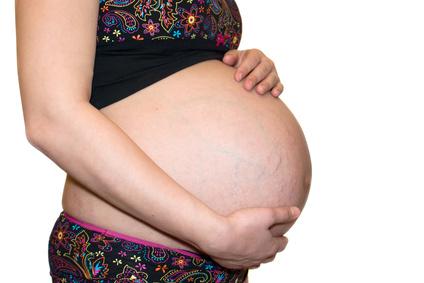Affecting less than one percent of pregnant women, reports the American Pregnancy Association, placenta previa can put a pregnancy at high risk. Depending on the severity and eventual outcome of a pregnancy in which placenta previa develops, risks to the baby may be minimal or more worrisome. One concern is cerebral palsy; Dr. Eric Rose, Clinical Assistant Professor at the University of Washington, does report that there is an increased risk of cerebral palsy with placenta previa.
What is Placenta Previa?
Placenta previa happens when the placenta is not properly placed in the uterus and tends to occur in the third trimester. Instead of up high in the womb, the placenta becomes positioned low and either incompletely or entirely blocks the cervix. Women may experience pain or bleeding due to this condition. Pregnant women diagnosed with placenta previa may be put on bed rest to prevent further complications, states the American Pregnancy Association.
Risks of Placenta Previa
One immediate concern with the position of the placenta is that the placenta may detach from the uterine wall before labor when the cervix starts to dilate. This can cause uncontrollable bleeding. Another concern is how much of the cervix is blocked by the placenta. If the cervix is completely blocked, then the baby cannot be delivered vaginally.
What is Cerebral Palsy?
Various forms of cerebral palsy exists, all of which affect a person’s ability to control his muscle movements. In mild forms, those with cerebral palsy have only certain muscle groups affected, such as both legs or one leg and one arm. Severe cases can affect the entire body, including the facial muscles. Persons with cerebral palsy often have an awkward walk and have difficulty with fine motor skills.
Causes of Cerebral Palsy
A brain injury causes cerebral palsy. What causes the brain injury varies and can occur in the womb, according to the March of Dimes. These causes include a fetal stroke, infection during pregnancy, oxygen deprivation due to the placenta detaching from the uterine wall (called a placental abruption) and premature birth. The March of Dimes specifically mentions babies born before 37 weeks and weighing less than 3.5 lbs as being a significant risk factor for cerebral palsy.
Placenta Previa’s Potential Role in Cerebral Palsy
The possible connection between placenta previa and cerebral palsy lies in the increased risk of having a premature baby or the placenta previa turning into a placental abruption. If the mother starts to bleed severely without stopping, then doctors will perform an emergency C-section, no matter the gestational age of the baby. If this occurs before 37 weeks and the baby’s weight is low, then the risk of cerebral palsy is greater than for a baby born full term.
Photo Credit
- pregnant woman image by Roman Barelko from Fotolia.com





